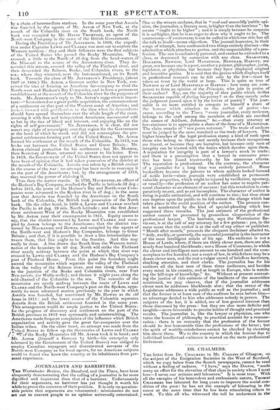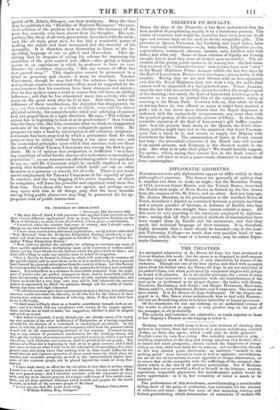DR. CHALMERS.
THE letter from Dr. CHALMERS to Mr. Comaiss of Glasgow, on the subject of the Emigration Societies in the West of Scotland, which we copy below from the Scotch newspapers, cannot be read without a feeling of sadness. "I have," says the Doctor, "made many an effort for the elevation of that class in society whom I most love—I mean our artisans and labourers." It is most true. With all the energies of his benevolent and enthusiastic nature, THOMAS CHALMERS has laboured for long years to improve the social con- dition of the poor : he has set the example of labouring in the cause at the same time that he has been stimulating others to work. To this all who witnessed the toil he underwent in the parish of St. John's, Glasgow, can bear testimony. Since the time that he published his "Stability of National Resources" the prac- tical solution of the problem how to alleviate the distresses of the poor has scarcely ever been absent from his thoughts. His sym- pathies, like those of all truly great minds, have been with the weak ; and, like all truly great men, he has had a wonderful power of rnaking the rudest and least instructed feel the sincerity of his sympathy. It is therefore most distressing to listen to the de- sponding language of one so gifted and benevolent. After de- claring that he despairs of seeing his scheme for improving the condition of the poor carried into effect—after giving a languid assent to an experiment in which he professes to have no con- fidence—he exclaims, dejectedly, " But my season of effort has now passed away ! " This depression cannot be permanent in a mind so generous and elastic : it must be transient. Thomas CHALMERS, though he may feel that his schemes have not been and perhaps cannot be carried into effect, must be supported by the consciousness that his exertions have been strenuous and sincere ; that he has spoken many a word in season that will have an abiding influence ; and that he has stimulated many into activity who will carry on the good work after be is at rest. And when, under the influence of these recollections, his dejection has disappeared, he may see that matters are in a train in which, even with his abated physical activity, his comprehensive mind and subduing eloquence may yet propel them in a right direction. He says, "The scheme of a poor-law is beginning to look at us in good earnest :" then it is the time for those who, like him, entertain what we think an exaggerated estimate of its dangers, to propose safeguards against them. He proposes to raise a fund by subscription to aid voluntary emigrants : a measure has been proposed by which a permanent fund for that purpose may be raised without laying a tax upon any one; and the economical principles upon which that measure rests are those the truth of which THOMAS CHALMERS was among the first to pro- claim. He is of opinion that emigration is inefficient "as a last- ing expedient of relief for the distress of a redundant or unemployed population " : no one measure can afford lasting relief—it is quackery to say so ; and Dr. CHALMERS might be usefully employ ed in ex- posing that fashionable empiricism which holds out one or other measure as a panacea—a remedy for all evils. There is yet much useful employment for Thomas CHALMERS in his capacity of pub- lic teacher ; and the very flagging of his active impulses, of which he complains, will leave his powerful and capacious mind more free from bias. Even those who have not agreed, and perhaps never may agree with him in all things, pray that the most loveable among living public characters may long be preserved for his ap- propriate task of public instruction.



























 Previous page
Previous page